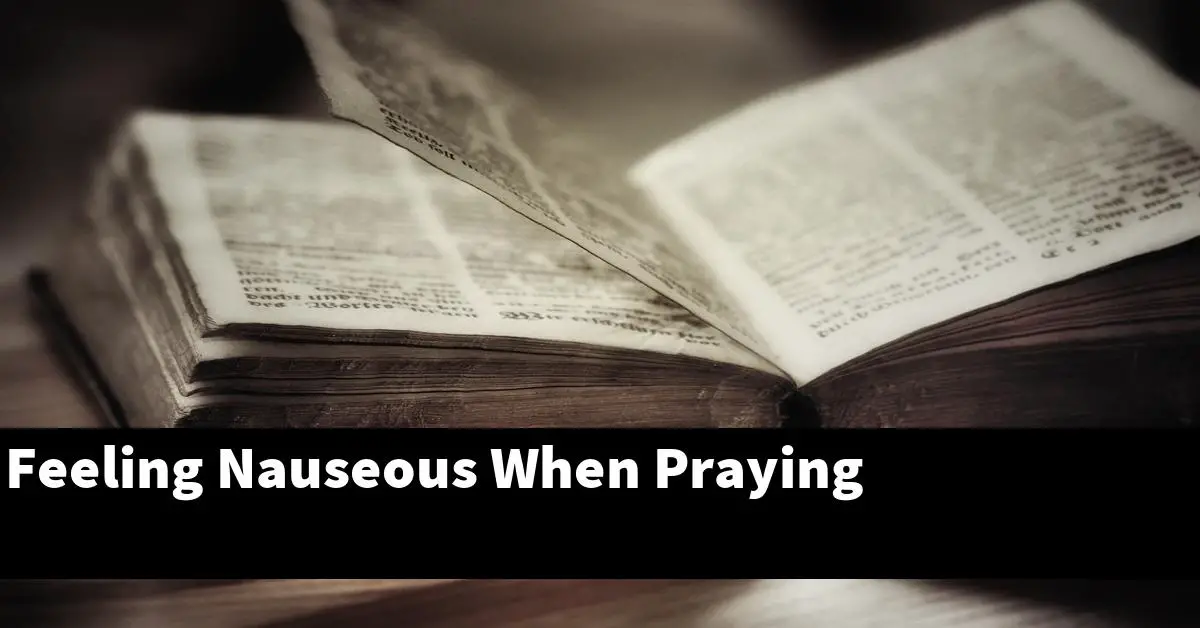Why do some people feel nauseous when they pray?
There are many reasons why someone might feel nauseous when praying. It could be due to nerves, anxiety, or even motion sickness. If the feeling is persistent, it is best to consult a doctor to rule out any underlying medical conditions.
The article is going to cover the reasons why people may feel nauseous when praying, as well as some possible solutions to the problem.
When to seek medical attention for feeling nauseous when praying.
Assuming you are referring to nausea during Salah:
There are a few things that could be causing nausea during Salah. It could be something as simple as not having eaten enough that day or drinking enough water. If you are pregnant or have a medical condition like anxiety or vertigo, you may also be more prone to feeling nauseous.
If you only feel nauseous occasionally during Salah, there is no need to seek medical attention. However, if you are feeling nauseous every time you pray or it is interfering with your ability to focus and pray properly, it is a good idea to speak to your doctor. They can rule out any medical causes and provide you with advice on how to manage nausea.
What may be causing feeling nauseous when praying.
There are a few potential causes for feeling nauseous when praying. It could be a simple case of nerves or anxiety, as many people feel anxious or nervous when praying. It could also be a sign of dehydration, as dehydration can cause nausea.
If you’re praying for a long period of time, you may also experience nausea due to hunger. finally, it’s possible that you’re experiencing motion sickness if you’re praying while moving.
If you’re feeling nauseous while praying, try to relax and take deep breaths. Drink plenty of fluids and eat something if you’re hungry. If nausea persists, it’s best to consult a doctor to rule out any underlying medical conditions.
How to manage feeling nauseous when praying?
The Bible actually doesn’t say anything specifically about vomiting, but there are a few things we can glean from scripture about how to deal with feeling nauseous when praying.
- First, we know that God is sovereign and in control of all things (Psalm 103:19). This means that He is aware of our situation and knows what we are going through.
- Second, we are told to cast our anxieties on Him because He cares for us (1 Peter 5:7). This means that we can bring our concerns and worries to God in prayer, and He will hear us and help us.
- Finally, we know that God is faithful and will never leave us or forsake us (Hebrews 13:5). This means that even when we feel nauseous and don’t think we can go on, God will be there with us, giving us the strength we need to continue.
How do you pray when you feel sick?
When you feel sick, it is natural to pray for healing. However, it is also important to remember that God is sovereign and His will is perfect. Even if we do not receive the healing we pray for, we can trust that God knows what is best for us and He will work all things for our good.
Here are a few things to keep in mind when you pray for healing:
- God is sovereign and His will is perfect.
- We can trust that God knows what is best for us.
- God will work all things for our good.
- Prayer is a means of drawing near to God and seeking His help.
- God is faithful and He will answer our prayers according to His will.
What is the most powerful healing prayer in the Bible?
There is no one “most powerful healing prayer in the Bible.” Instead, there are a number of prayers that can be effective in healing. Some of these include:
- The Lord’s Prayer: This classic prayer asks for God’s help in a number of areas, including healing.
- Psalm 23: This well-known psalm reassures the reader that God is always with them, even in times of trouble.
- Proverbs 3:5-6: This passage promises that if we trust in the Lord, he will bless us and heal us.
- Isaiah 53:5: This verse from Isaiah promises that by Christ’s stripes, we are healed.
- James 5:14-15: This passage from James instructs us to pray for one another when someone is sick, and promises that God will hear and answer our prayers.
How does the Holy Spirit communicate with us?
The Holy Spirit is the third person of the Trinity and is often seen as the invisible force behind the scenes. While we cannot see the Holy Spirit, we can see the effects of His work in our lives.
The Holy Spirit communicates with us in a number of ways. One way is through our conscience. Our conscience is that little voice inside of us that tells us when we are doing something wrong. The Holy Spirit uses our conscience to communicate with us and to guide us in the right direction.
Another way the Holy Spirit communicates with us is through our thoughts and feelings. The Holy Spirit can use our thoughts and feelings to communicate with us and to guide us in the right direction.
The Holy Spirit can also use our dreams and visions to communicate with us. Dreams and visions are a powerful way for the Holy Spirit to communicate with us because they can be very vivid and can often contain symbolic messages.
The Holy Spirit also communicates with us through the Bible. The Bible is the Word of God, and the Holy Spirit uses it to communicate with us. The Bible is full of stories, teachings, and principles that can help us to understand the will of God for our lives. The Holy Spirit can use the Bible to speak to us and to guide us in the right direction.
The Holy Spirit is a powerful force in our lives, and He communicates with us in a number of ways. We need to be open to the ways the Holy Spirit is trying to communicate with us so that we can follow His guidance.
Conclusion
It’s not uncommon to feel nauseous when praying. This can be caused by a variety of factors, including anxiety, stomach problems, and even dehydration. If you’re feeling nauseous when praying, there are a few things you can do to help ease the feeling.
First, try to relax and take deep breaths. If you’re dehydrated, drink some water. And if you have any stomach issues, try to eat something before you pray.


